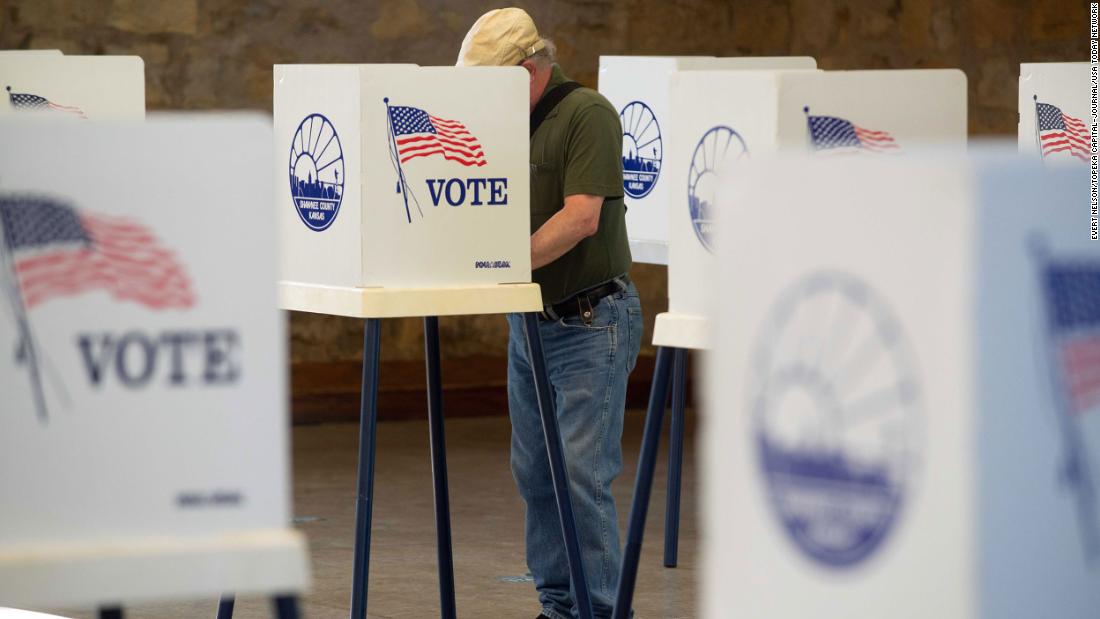
Trump’s loss two years ago in those battleground states seeded right-wing anger and turned Republican primary campaigns up and down the ballot into referendums on his election lies. Allies of the former President are seeking offices crucial to the balance of power in Washington and in state governments, where the GOP is hoping to gain control of the election apparatus ahead of the 2024 presidential contest.
A trio of House Republicans who voted to impeach Trump in the aftermath of the January 6, 2021, US Capitol riot are also facing voters for the first time. Michigan Rep. Peter Meijer and Washington Reps. Dan Newhouse and Jaime Herrera Beutler — three of only 10 Republicans to back Trump’s second impeachment — each face challengers from their own party.
The results of Senate primaries in Arizona, where Democratic Sen. Mark Kelly is awaiting a GOP challenger, and Missouri, an increasingly conservative state that Trump won by double digits in 2020, will clarify the road ahead for Democrats’ efforts to retain their narrow majority. In both states, crowded Republican fields had been dominated by election deniers.
In Missouri, state Attorney General Eric Schmitt will win the GOP Senate nomination, CNN projects. His victory is a relief for national party leadership anxious that former Gov. Eric Greitens would win and then lose the general election in November. Greitens had resigned in 2018 amid a sex scandal and accusations of campaign misconduct and more recently faced allegations of abuse from his ex-wife, which he has denied.
Schmitt and Greitens shared an 11th-hour endorsement from Trump, who said on Monday he was backing “Eric” and leaving it up to voters to decide which one, although both candidates immediately tried to claim the endorsement for themselves.
Echoing a pledge from Greitens, Schmitt — who was endorsed by Sens. Ted Cruz of Texas and Mike Lee of Utah — said last week that he would not support Senate Minority Leader Mitch McConnell for leader.
While Trump hedged his bets, the state’s junior senator, Josh Hawley, suffered a loss after backing Rep. Vicky Hartzler. One of two members of Congress seeking the nomination, she was critical of Trump in the aftermath of January 6, but still voted against certifying the presidential vote and touted her voting record with Trump on the trail.
Arizona’s long Republican primary slate will provide a series of tests for Trump allies. Republicans will choose a nominee to face Kelly, the endangered Democratic Senate incumbent. Blake Masters, an acolyte of Silicon Valley billionaire Peter Thiel, is Trump’s pick in that race. He is facing off with businessman Jim Lamon, who piled cash into a partisan “audit” of the 2020 results in Maricopa County and state Attorney General Mark Brnovich, who recently returned a report debunking a popular right-wing myth around “dead voters” but has mixed his defenses of the state’s election integrity with indulgences of conspiracy-minded activists.
An Arizona proxy war between Trump and Pence
The race to succeed term-limited Arizona Republican Gov. Doug Ducey has split the party, with Ducey and former Vice President Mike Pence endorsing Karrin Taylor Robson and Trump backing former television reporter Kari Lake, whose campaign has been fueled by the former President’s election lies.
Down the ballot in Arizona, the favorite for the GOP nomination for secretary of state — and the chance to run the state’s next round of elections — is Trump-backed election-denying state Rep. Mark Finchem, who attended the January 6, 2021, rally in Washington. Democratic Arizona Secretary of State Katie Hobbs is running for governor and favored in her primary against Marco Lopez.
Dixon will be taking on Democratic Gov. Gretchen Whitmer, who is seeking a second term. Whitmer is a key piece of the Democratic bulwark against Republican power in Michigan, where the GOP controls both legislative chambers.
Intraparty fights for the House
But the most anticipated race of the night, at least in Michigan, is for the GOP nomination in a western House district that has become a flashpoint in both parties’ national infighting. Meijer, who was first elected in 2020, is facing a primary challenge from John Gibbs, a fervent election denier running with Trump’s support.
Gibbs, though, has also been the beneficiary of Democratic meddling. The party’s House campaign arm, believing that Gibbs is a less viable general election candidate, has run more than $300,000 in ads ostensibly attacking his alliance with Trump with the goal of boosting him in the primary. But that strategy has angered some on the left who think it undermines their broader messaging against political extremism in the GOP, while sparking fears the gamble could backfire if Gibbs is actually elected and makes it to Congress.
Meanwhile, in Michigan’s 11th Congressional District, Rep. Haley Stevens will defeat fellow Democratic Rep. Andy Levin, CNN projects, in a clash of incumbents that was the latest chapter of a proxy fight between moderates and progressives.
The American Israel Public Affairs Committee (AIPAC) had backed Stevens and its new super PAC, United Democracy Project, spent more than $4 million to boost her bid. UDP’s outlay, along with bundling by AIPAC, spurred another pro-Israel group, the liberal J Street, to jump in on Levin’s behalf, splashing $700,000 in a July ad buy for him.
This story has been updated with additional developments.
